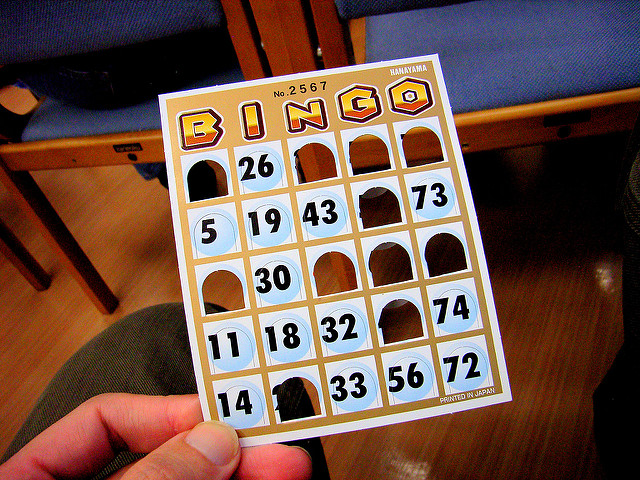|
|
 |
 |
| |
| |
| Is there a way to win at bingo? |
| |
| |
|
|
| |
 |
| "Bingo" (CC BY-SA
2.0) by chidorian |
| |
Bingo is one of the most popular
activities in the United Kingdom. What was supposed to a fun activity to do
during leisure time has now become one of the most beloved activities of the
nation. In fact, as reported by
The Mirror, bingo is now popular than tennis - the
number of people playing bingo per month is 1.9 million, while those involved
in tennis per month add up to 1.7m. If bingo was a sport and not a game, then
it would be the sixth most popular sport in the UK.
Joseph Granville's strategy
Bingo is a game of probability,
a game of chance; for most, it is just about hoping that the random numbers
that are called out match those that you have on the cards. Joseph Granville
thought otherwise and devised a strategy he thought could help him win at
bingo.
Granville was a successful American stock market investor who
wanted to find patterns in the random numbers that are drawn to make successful
predictions.
Granville’s theory goes something like this. In
a 75-ball bingo game, the probability of any number being drawn first is 75/1,
but thereafter the odds decrease exponentially with each ball that is drawn
out. Granville made three observations:
- The same number of numbers ending in 1s, 2s, 3s,
and so on will be drawn.
- A balance between the number of odd and even
numbers drawn will exist.
- A balance between high and low numbers picked
exists.
If Granville’s findings
are to believed, then card selection is key to winning in bingo. According to
the law of probability, there is a strong tendency for a number ending in 1,
then 2, then 3, to be called. This means that it would be a wise idea to play
with cards that have the widest possible range of final digits on them.
According to Granville’s studies, 60% of first 10 balls picked up feature
different last digits.
According to Granville’s studies, 60% of
first 10 balls picked up feature different last digits. This means that if you
want to increase your chances of winning a bingo game, you should select cards
with as many numbers that are as different in the second digit as possible,
meaning that cards with numbers 12, 22, 32 and so on should be avoided.
Granville's theory applies to a 90-ball bingo as well..
L.H.C Tippett's
theory
Another theory on how to win at bingo was proposed by English
mathematician L.H.C Tippett. It is a complex theory about randomness according
to which the more numbers are called in a wheel-of-balls game, the most likely
those numbers will move towards the median number. This means that if it is a
75-ball bingo long game, you should choose numbers closer to 1 and
75.
Bingo games variants
Aside from the traditional 90-ball
bingo, the 75-ball bingo and the 80-ball bingo, with online and mobile bingo
sites flourishing there has been an increase in the number of variants
available for players. At at a site like Sun Bingo,
popular bingo games include Cash
Cubes and Rainbow Riches Bingo. Sun Bingo is also home to an interesting
variant of the bingo game, based on popular TV show Deal or No
Deal. Another unusual variant is Cover All, which rewards the first
player to cover all the spots on their bingo card. What is interesting in this
game is that there is only one winner. In Four Corners, the player who covers
their bingo card’s four corners wins. It might be worth trying to
implement Granville's and Tippett's theories on these variants to see if they
work. |
| |
 |
| |
 |
| |
|
|
|
 |
|
 |